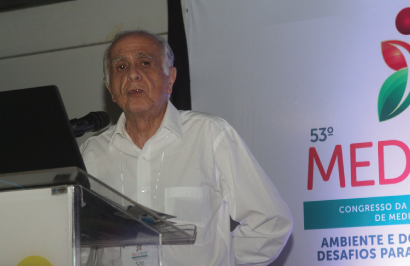
Malaria: Battle against the disease has lost strength, alerts UnB professor Pedro Tauil
After a decrease trend, malaria cases in the world rise in 2016 Death count remained around 445 thousand, number similar to the previous year
12/12/2017
In the past years, until 2016, the incidence, hospitalization and deaths by malaria in Brazil were systematically dropping every year, what could have led to a priority reduction in the disease’s control policy in 2017
The progress in world fight against malaria has stopped. This is the result of a recent report by the World Health Organization (WHO). Although global data about 2017 are still unavailable, the “2017 malaria report” gives a wide picture on the progress fighting the disease. The Organization hopes that new data could “waken” the world. According to the paper, Brazil confirmed 129,251 cases in 2016 and the goal to eliminate the disease is not a reality in our Country, since we are not among those with less than 10 thousand cases.
The epidemiologist and professor at the Tropical Medicine Center at Brasilia University (UnB), Dr. Pedro Tauil, claims to be concerned with the numbers, since in 2016 there was a 5 million cases increase if compared to 2015, despite the great advances fighting the disease acknowledged by WHO Director-General, Tedros Adhanom Ghebreyesus.
Still according to the infectious diseases specialist, the concern increases when we assess the countries where the risk of infection is greater. The situation in Venezuela is chaotic. Malaria incidence there is more than twice the incidence in Brazil. There is lack of official data, diagnostics, medications and resources to keep vector control activities. In Colombia, there was also an incidence increase, however due to socio-economic factors, as occupation of new mining areas.
“Unfortunately, in Brazil, this situation has deeply worsen in 2017, with an increase of over 40% in the number of cases if compared to 2016, especially in Amazonas and Pará States. In the past years, incidence, hospitalization and deaths were systematically decreasing every year. This could have led to a priority reduction in the disease’s control policy, represented by the merger of the malaria and dengue national coordinating committees, in the Health Ministry’s Health Surveillance Secretary. At a city level in the Amazon region, control activities were disorganized with changes in political changes in municipal administrations”, he alerts.
To the professor, some measures could help avoiding a setback, among them: enhancement of control programs funding, performing the maximum number of diagnostic confirmation tests and timely treatment of suspicious cases, increasing coverage of impregnated mosquito nets, performing integrated vector control actions (in-house insecticide spraying, reduction of breeding sites by backfill or drainage or application of larvicides, according to the situation of each place).
In order to meet the WHO’s Global Technical Strategy, that intends to reduce by 40% the incidence of disease cases and mortality rates until 2020, we must improve funding to support countries, especially in Africa, South of the Sahara desert. “We must increase coverage of populations with access to impregnated mosquito nets. These goals are difficult to achieve, but not impossible”, he adds.
There are researches on new medications, especially against the P. falciparum, but unfortunately, we still do not have effective and safe substitutes of Artemisinin. Regarding the expectations on a malaria vaccine, Professor Tauil believes this possibility is still remote. “Those currently available against P. falciparum, in field tests, have not showed high effectiveness. A vaccine against a parasite is difficult due to the great antigen multiplicity it has”, the infectious diseases specialist explains while adding that in the fight against parasites resistant to combined therapy with Artemisinin by-products, searches for new medications appear to be the only way.…










